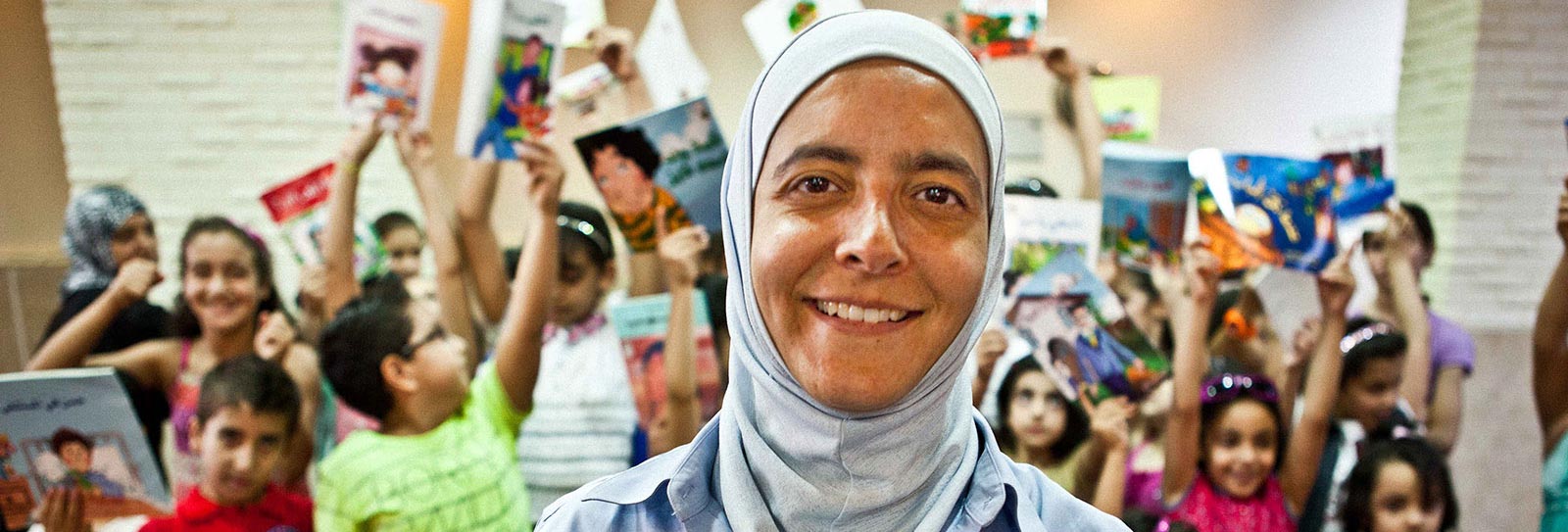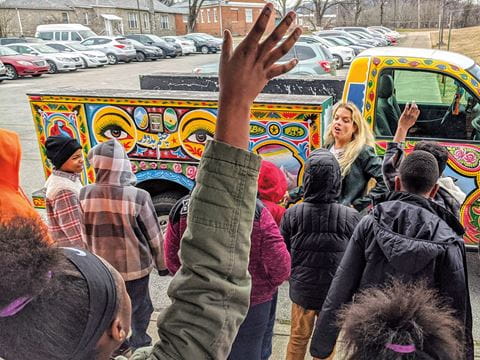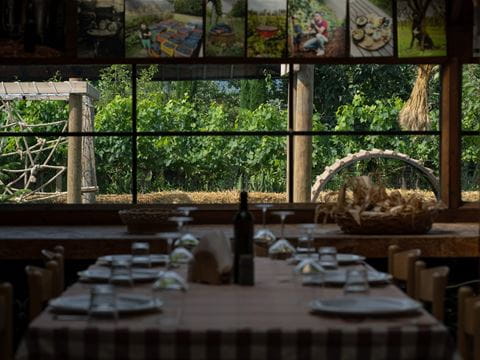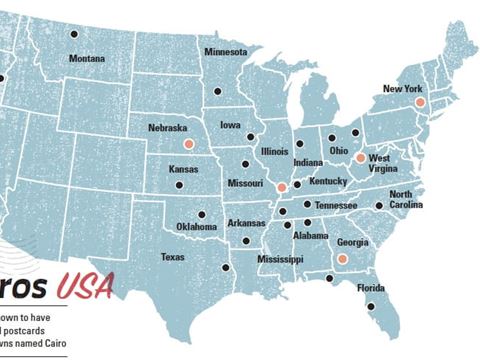
For the Love of Reading: Developing Close Reading Skills
Women Studies
Levant
Julie Weiss
Explore how a reading program based in Amman, Jordan, is changing how people access to storytellers and libraries.
The following activities and text are abridged from “For the Love of Reading,” written by Piney Kesting.
WARM UP
Before reading or looking at the activities, do this warm up to hypothesize the theme and main idea.
IF YOU ONLY HAVE 15 MINUTES ...
Conduct a close reading exercise and construct a linear timeline of important dates with descriptions.
IF YOU ONLY HAVE 30 MINUTES ...
Answer questions that cover key periods in the development of the “We Love Reading” program. Then write a story on how the We Love Reading program was formed and grew to have impact worldwide.
VISUAL ANALYSIS
Explore how photographs contribute to the written content of an article.
Directions: As you read, you will notice certain words are highlighted. See if you can figure out what these words mean based on the context. Then hover over the word to see if you’re right.
For the Love of Reading
February 11, 2006, was a warm and sunny Saturday in Amman, Jordan. A lady in a funny hat used different voices and tones to read stories to a few dozen kids at a local mosque. They knew her only as the hakawati, or storyteller. At the end, she gave each child a book and promised more stories in two weeks.
The lady in the funny hat was Rana Dajani. During the week, she was a professor of molecular cell biology at the Hashemite University in Jordan. As of that day, she was also founder of We Love Reading (WLR). In Arabic it’s nahnu n’hibu al qira’a.
Since then, her local reading circle has gone global. Today 60 countries around the world host WLR programs. By 2019 almost 12,000 WLR volunteers had led some 152,000 reading sessions for almost half a million children worldwide. In addition, 4,300 WLR libraries have opened. Each is a place where trained volunteers read aloud and exchange books with children.
This was quite a leap from the early days. Rana Dajani says she spent three years spreading word of WLR from neighbor to neighbor, and with radio ads and leaflets. She did all of this while excelling at her day job as a college professor.
In 1999 Dajani received a Fulbright Student Grant to pursue a Ph.D. in molecular cell biology in the US at the University of Iowa. By her early 40s, she had become a world-renowned genetics expert.
“As a scientist I feel a strong sense of responsibility toward all of society to help develop solutions for today’s most pressing problems,” Dajani has written. “But I’ve always wanted to have an impact” beyond science. That’s what led her to found “We Love Reading”.
The seeds for WLR were planted in her youth. “I was a bookworm,” she recalls. The move to Iowa City with her husband and four children in 2000 nurtured those seeds.
The children spent hours after school at the city’s public library, taking part in children’s programs. When they got back to Amman, Dajani noticed that despite Jordan’s 98-percent national literacy rate, libraries were few, and their hours were short. None offered activities for children.
“Research underscores the impact reading has on brain development as well as on social skills,” she says. “Especially before the age of 10.”
How did Rana Dajani’s time living in the United States inspire her to start WLR?
What other factors inspired Dajani to start WLR?
Dajani’s desire to promote reading in Amman became a family project. She, her husband, and their children attracted volunteers, taught them read-aloud storytelling techniques and helped them set up informal children’s libraries.
They helped choose books and arrange reading sessions. They also took turns reading aloud to children. They built WLR’s first website using a logo the family created at the kitchen table.
At first it was difficult to get volunteers. People didn’t think that a homegrown project could make a difference. Yet more children kept attending Dajani’s readings. Kids began to ask their parents to read to them at home. Local libraries reported a five-fold increase in book-borrowing.
In 2009 the Synergos Foundation presented Dajani with its Arab World Social Innovator Award. She used the $34,000 grant to offer free two-day training workshops. She encouraged the first volunteers to attend by offering free transportation and lunch. She hired Palestinian artist Denes Assad to teach the art of storytelling. And she bought 25 books for each newly trained ambassador.
Dajani recalls an early success story, a woman about 70 years old from a town outside Amman. “She was illiterate. But she wanted to take the training, which is oral and very interactive. Afterwards, she enrolled in a literacy course. Two months later she came back and said, ‘I’m ready!’ We gave her the 25 books each ambassador gets,” says Dajani, smiling. Back home, the woman started a reading circle of her own.
“Once people see how important WLR is, they will do whatever it takes to become an ambassador,” says Ghufran Abudayyeh, who is WLR’s training and communications officer. Encouraging love of reading is WLR’s main goal. But “it’s also about the empowerment of women in their local settings once they become ambassadors. When they see the impact they have on children by reading to them, they start believing in their own ability to do more.”
By 2010, ambassadors were leading WLR groups across Jordan, and word was spreading beyond. WLR projects took off in Thailand and Kazakhstan. Dajani registered WLR with the Jordanian Ministry of Culture under a new umbrella NGO she named Taghyeer (Arabic for change).
In 2013 the organization counted 10,000 children participating in storytelling and reading sessions. It was chosen as the “Best Practice” by the US Library of Congress Literacy Awards Program. It was just one of many awards WLR has received.
Two years later WLR received $1.5 million from the United Nations International Children’s Emergency Fund (UNICEF) and $2 million from the US Agency for International Development (USAID). On October 1, 2020, acknowledging the value of the WLR program to refugee families, the United Nations High Commissioner on Refugees (UNHCR) named Dajani a regional winner of its annual Nansen Refugee Award.
“Part of WLR’s success is ownership,” explains Mohammad Awad, who is Dajani’s husband and former WLR CEO. “It’s the people.” Ninety percent of the ambassadors are women, he explains. They range from ages 16 to 80. All ambassadors are encouraged to train others in their communities.
How has WLR impacted women in particular?
Research into the impacts of WLR show positive changes. At all ages, WLR children outperform non-WLR peers in reading ability. WLR also leads to more books in the homes of participating families and more children who describe reading as a hobby. These changes predict larger improvements in executive functions, especially for younger children and for families with lower incomes.
Researchers have also found that WLR helps traumatized children, especially those living in refugee camps. It helps with anxiety and anger management. It also cultivates mental well-being.
“Our WLR program often has the greatest impact in the harshest conditions,” explains Abudayyeh.
“A lot of NGOs provide people in refugee camps with the essential items needed to survive,” adds WLR field officer Laila Mushahwar. “WLR actually helps people thrive and believe in themselves.”
In March 2020, when the COVID-19 pandemic forced families to shelter at home and schools to shut down, WLR began offering free trainings online in Arabic and English. It posted read-aloud sessions on its YouTube channel and shared stories from global ambassadors on Facebook and Twitter. WLR, Dajani explains, “becomes a placeholder to keep children engaged with learning in a fun way while schools are closed.” The positive parent-child interactions it fosters are also beneficial.
“WLR is no longer just a program to foster a love of reading among children,” asserts Dajani. It has grown into a global, internationally acclaimed movement that empowers WLR ambassadors to become community leaders.
“We have become a social movement. We’ve gone viral,” she exclaims.
And for Dajani, it all goes back to the first command revealed to humanity in the Qur’an: “Iqra!” (“Read!”)
Other lessons

How Art Connects
For the Teacher's Desk
Art links everything—cultures, history, even math. Want to hook students? Try teaching through the art that surrounds us with these stories.
Breaking Bread: Using Food As a Teaching Tool
For the Teacher's Desk
Using food as a teaching tool, students widen their global understanding of other cultures while deepening their connection to the world.
Cairo Across America: Interpreting Geography, History and the Meaning of a Name
Geography
History
Uncover how towns named Cairo turned ancient inspiration into uniquely American stories of aspiration, identity, and change.